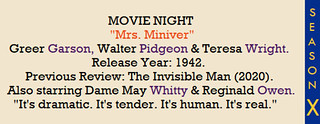 Review #1360: Mrs. Miniver.
Review #1360: Mrs. Miniver.Cast:
Greer Garson (Kay Miniver), Walter Pidgeon (Clem Miniver), Teresa Wright (Carol Beldon), Dame May Whitty (Lady Beldon), Reginald Owen (Foley), Henry Travers (Mr. Ballard), Richard Ney (Vin Miniver), Henry Wilcoxon (The Vicar), Christopher Severn (Toby Miniver), Brenda Forbes (Gladys), and Clare Sandars (Judy Miniver) Directed by William Wyler (#509 - Roman Holiday and #1022 - Jezebel)
Review:
War-time films could come in many genres, and 1942 is a prominent one to spotlight. After all, this film dominated the Academy Awards for its year, winning for Best Picture, Director, Actress, Supporting Actress, Screenplay, and Cinematography. The film is based on a series of newspapers columns for The Times by Jan Struther, which had started in 1937 (with a collection of those columns being published into a book in 1939) on an ordinary sort of woman with ordinary sort of life, with most of the essays being done before World War II was declared, and four writers were credited for adapting it to the screen: Arthur Wimperis, George Froeschel, James Hilton, and Claudine West. At the hand is a director with a prime like no other in William Wyler, who came from working at Universal Studios as a stage cleaner and mover to director of Western quickies in two years. In the next decade, he would hone his craft in a variety of genres from drama to comedy that would lead to plenty of notice with films such as Dodsworth (1936) and Wuthering Heights (1939). A noted perfectionist, he would generally insist on multiple re-takes, which proved to be worth it for several actors, directing 36 actors to Academy Award nominations and 14 to wins, both records. He directed films in six decades until his last with The Liberation of L.B. Jones (1970). Garson and Pidgeon make for a well-rounded bunch of leads (with this being the 2nd of eight collaborations, including a sequel with The Miniver Story eight years later), both having risen from stage to screen (the former in the 30s, the latter in the late 20s) to carry a movie that certainly rouses plenty of spirit and inspiration to make for a solid romance war drama, one wrapped in sentiment under propaganda that makes its mark most of the time.
It certainly rose plenty of spirits, with Winston Churchill once stating that it had done more for the war effort than a flotilla of destroyers, and Franklin D. Roosevelt had ordered the final speech (involving how this is a "war of the people", not just soldiers) broadcast over radio. That speech was written by Wilcoxin (the one who says the striking words) and Wyler the night before filming it. Regardless of its war elements, there is a tender touch to the film that manages to resonate in drama after nearly eight decades that can't be lost to time. It works with a 133 minute pace in holding its family aspects and the looming war together with patience and skill. Garson commands the screen with grace, a courage in the manner of the stiff upper-lip that resonates for her time on screen. Pidgeon does just as much in conveying charm with capable chemistry in the ways you would expect with Garson alongside other scenes when dealing with the war efforts. Wright makes her presence clear any time she is on screen, a vivid and ideal one in a weary-but-able world. A noted actress of the screen (along with her charity work during the first World War) before making her screen debut at 72 in 1935, Whitty strikes attention with no trouble at all, marked with discipline in her nerves in her moments on screen. The other members of the cast do just fine in rounding out the elements necessary to make for capable drama in perseverance. It is the kind of stuff that can drive emotions out for passion, for sacrifice and support that one can still identify with in some way in our trying times today, whether one resides in Europe or elsewhere. For the most part, the film knows where to go in making capable entertainment, and it rightfully endures as a fair gem for both its director and Metro Goldwyn Mayer.
Overall, I give it 9 out of 10 stars.

No comments:
Post a Comment